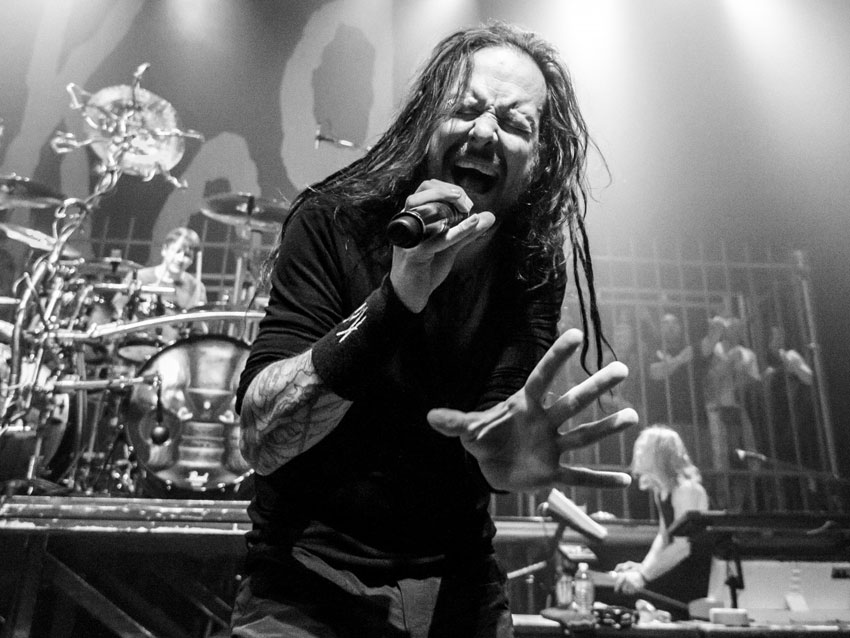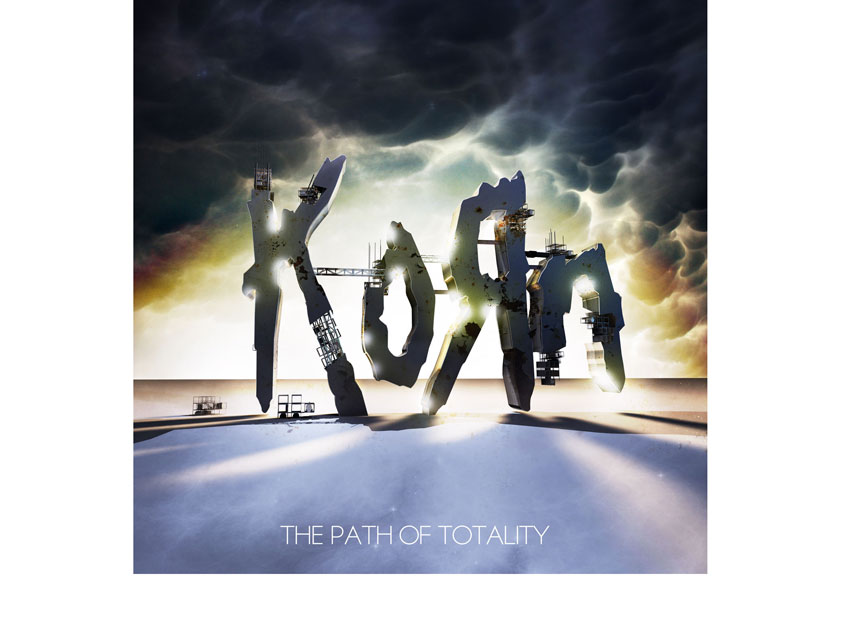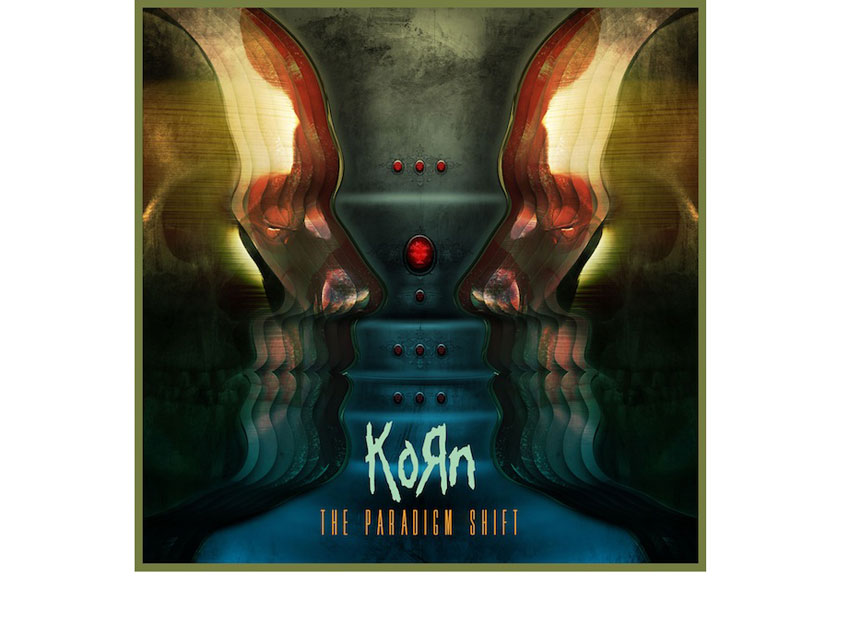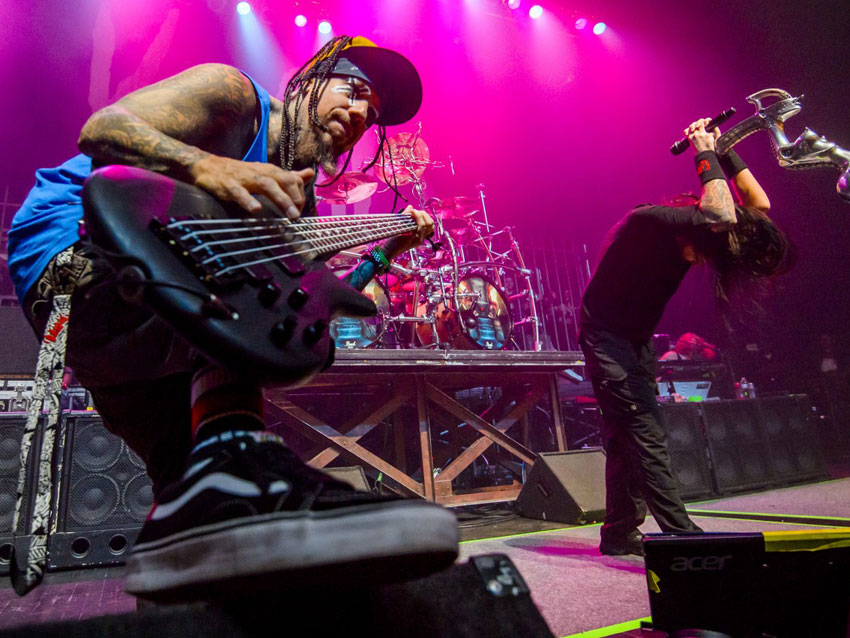Korn talk past, present and future
Fieldy, Munky and Ray Luzier speak

Introduction
Bakersfield nu metal survivors Korn needed to do something big to top the attention-grabbing, dubstep-laden, genre-merging enormity of 2011’s The Path of Totality. And what they did took just about everybody by surprise: They picked up the phone and brought original guitarist Head back from exile.
Head, who found Jesus, left Korn and launched a solo career (roughly in that order) in 2005, immediately breathed new life into the band – ironically, in doing so, taking them away from their brave new sound and back to their signature early days feel.
The result is the new album The Paradigm Shift. We tracked down guitarist Munky, bassist Fieldy and drummer Ray Luzier to get the lowdown on how it all came together.

The Path of Totality
The Paradigm Shift follows The Path Of Totality, a dubstep-heavy record that won critical acclaim by the bucket load.
Fieldy: “That kind of music [dubstep] already has bass. I knew that, so I really didn’t want to put any more bass into my mix. Then you had all of the weird sounds, and I really didn’t want to interrupt those, so I had to just find little holes to do little areas of my style. It was challenging because I want to complement everything, and it was a fine line. I needed to find a balance. But it all worked out cool.”
Ray: “Korn always had an element of electro and hip-hop, and on that last one we took that to the extreme.”
Munky: “[The Paradigm Shift] is good because everybody’s involved. I didn’t have that experience on the last album; I wasn’t there for any of the mixes, and that’s why you can’t hear my guitar [on Path of Totality].”

The Paradigm Shift
This time around, there was a different approach, and a whole new sound came out.
Fieldy: “We always take different approaches. This time we got into the studio with all of us together, except for Jon [Davis, vocals]. It was kinda nice that way because we were able to create the music and have the songs for him done, and he could just come in and take a listen. That worked out really good because we got a good chunk of songs done. We wrote 25 songs, so we were able to choose from a big variety."
Ray: “The sound is the heart of Korn. All five of us were in a room off and on for several months. It sounds very 2013, though. It’s a whole other vibe now with Brian back in. Nothing was rushed at all; we let everything happen naturally. This is the first record I’ve made in years where I don’t want to skip any tracks!"
Munky: “Head had a couple of riffs, I had a couple of riffs, and pretty soon we had 20 songs. We recorded 20, and 15 of those will go on the album. We’ve never had that many songs when recording.”
Head: “It’s a good problem to have. Some of them that didn’t make it, we have funny names for songs like Weiner Schnitzel and Bumble Butt, Taco Titties. We had a lot of good songs.”

Return of Head
Key to the return to their roots was guitarist Head rejoining the band.
Fieldy: “Head was there right from the first day in the studio. There was this undeniable chemistry. Having Head there definitely pushed me back to having my old bass tones. Head was like, ‘You’ve got to get that old bass tone; that is what people want to hear.’ I’ve got to thank Head and Munky for pushing me to get my bass tone back. It worked out real good.
“I couldn’t wait to get back in there and just see what happened. There was a chemistry there that wasn’t forced. If there’s a band out there that has a majority of the original members and they continue to make music, then that [chemistry] will happen. I don’t care who brings in different styles and influences – if you have those members you’re always going to get that chemistry.
“With Head being gone for eight years and coming back, it was kinda cool to see him coming back with some fresh ideas – new ideas that we have never done before. I think that really pushed everybody.”
Ray: “We started writing last July, wrote about 25 tunes and recorded 15 or 16. To have Head back in the fold, that’s a big bonus. Ever since I’ve been in the band, I’ve wanted those four original guys up front, so it was a big deal to have him back.”

Tone
With Head pushing for Fieldy’s distinctive bass sound, the five-stringer put on his armour and prepared to do battle with the record’s production team, while Munky strived for a nasty, biting tone.
Fieldy: “What happens when you start out, my bass tone is usually there, but then as a producer comes in they usually change things. The times down the years when you have heard my bass tones, they were the times when I was able to sit there and battle for it. Over the years it has become harder to battle because you have people constantly pushing.
“Getting that tone is really simple for me; it is more difficult for producers. They want to go with a bass tone from a player that they are familiar with, and my bass tone is not familiar to most producers. I really just wanted to focus on my tone and keep it simple.
“I don’t know where it came from. It was just something that came. I like messing with EQs, and I just did whatever I liked. Over the years now, I look back on it, [but at the time] I didn’t realise [the impact that it had on the nu metal scene]. I was just doing something that I liked. To me, when I listen to it, it sounds like percussion, almost like there’s another drummer there.”
Munky: “We just wanted the guitars to be really in your face and biting on this new record; that’s what the Peavey amp [Munky and Head used a Diezel Herbert and Peavey 5150 in the studio] was able to give us. We always want to hear new tones and things that interest us. When we play together, it sounds like Korn, so we weren’t too concerned with the tone – we just wanted it to be bright and biting with that low end.”

In the studio
While original drummer David Silveria continues to put the feelers out for a return to the band, Fieldy insists that Ray Luzier is more than doing his bit behind the kit.
Fieldy: “You know what it really did – for me, Ray is communicating with me. We communicate as we’re playing through music and verbally through voice. What I learned a lot this time is playing against each other. If he’s hitting a kick drum, a lot of bass players will go with the kick drum. If he hits the kick drum, I will go on the off of the kick and fill the holes. Confirming that and knowing that has really let us both shine."

Going live
And now comes the time to take the record on the road – although Fieldy’s bass tone could yet again come to bite him on the backside.
Fieldy: “It always kind of worked. My battle down the years has been playing live with sound guys – they wouldn’t get it so it wouldn’t be in the mix. It has been a battle over the years to get people understanding, because they hear the word 'bass.' We don’t need bass; I don’t want bass. We have seven-string guitars that have so much bass that we don’t need anymore. It has been a battle to get what I like. Once everybody gets it and I get the tone that I want, I’ll probably want something else!”

Rich is a teacher, one time Rhythm staff writer and experienced freelance journalist who has interviewed countless revered musicians, engineers, producers and stars for the our world-leading music making portfolio, including such titles as Rhythm, Total Guitar, Guitarist, Guitar World, and MusicRadar. His victims include such luminaries as Ice T, Mark Guilani and Jamie Oliver (the drumming one).









